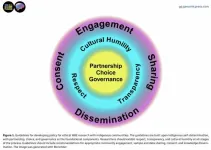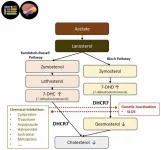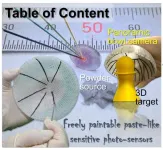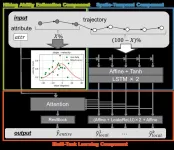(Press-News.org) A new paper in the Journal of the National Cancer Institute, published by Oxford University Press, finds that almost 20% of patients in middle-stage cancer drug trials receive treatment that eventually prove effective enough to get FDA approval. This may have important implications for drug development and clinical trial recruitment.
The development of new medications typically has three stages. In phase 1 trials, researchers assess drugs for safety and dosing (“What is the best tolerated dose for the patient?”). Phase 2 clinical trials determine whether a new drug shows signs of efficacy (“How much does the drug reduce disease?”). Drugs showing promise in phase 2 are then evaluated in phase 3 trials, which are conducted at multiple centers with at least several hundred patients and often inform whether the FDA approves of the drug for use as treatment.
However, unlike initial phase 1 trials, all patients in phase 2 trials receive drugs at the doses intended for routine use with the expectation the drug will be active and beneficial, though this is unknown from prior experience. With more patients treated at an active dose, a drug is more likely to have side effects. Therefore, the question of efficacy in phase 2 trials is an important consideration for patients wishing to receive newer treatments.
The aim of the study was to estimate the proportion of cancer patients in phase 2 trials who receive new interventions that are later deemed safe and effective and approved by the FDA.
The researchers here identified 2,730 phase 2 clinical trials, beginning between Nov. 2012 and Nov. 2015, 1,154 of which met eligibility and 400 of which were randomly sampled for inclusion. These phase 2 trials had a total patient enrollment of 25,002 patient-participants in 608 specific cohorts or arms (including control arms) which tested 332 drugs. Twenty-five drugs were evaluated in more than 10 trials, 155 in 2-10 trials, and 152 in one trial only.
The investigation found that the FDA later approved 71 drug regimens in the tested indication, and 1 in 6 (16%) patients in phase 2 trials received such regimens. However, the authors of the study point out that accessing a drug that later gets FDA approval doesn’t necessarily mean the patient will benefit. “Keep in mind that approved drugs don’t work for every person. For many FDA approved cancer drugs, only half to a tenth of patients meaningfully benefit,” said the paper’s lead author, Charlotte Ouimet.
The authors of the study say that these findings give patients important information on expectations for phase 2 trials. Most patients who enroll in phase 2 have advanced cancers that lack standard treatment options. Many such patients are likely to regard a 16% probability of receiving a drug that later secures FDA approval for their condition as favorable odds.
“If you’re a cancer patient and you are invited into a phase 2 trial, keep in mind that five of six patients get treatments that do not go on to approval” said Jonathan Kimmelman, another author. “Just the same, your odds are dramatically better than they would be for a phase 1 trial.”
“Your odds of receiving an effective drug in phase 2 are quite a bit higher than for phase 1 trials. But probably still a lot lower than for phase 3 trials, where the odds are probably more like 1 in 3,” Kimmelman continued.
The paper, “Proportion of Patients in Phase 2 Oncology Trials Receiving Treatments that are Ultimately Approved,” is available (at midnight on February 25th) at https://doi.org/10.1093/jnci/djaf013.
Direct correspondence to:
Jonathan Kimmelman
Professor of Equity, Ethics and Policy
McGill University School of Population and Global Health
2001 McGill College Avenue
Montreal, QC H3A 1G1, CANADA
Jonathan.kimmelman@mcgill.ca
To request a copy of the study, please contact:
Daniel Luzer
daniel.luzer@oup.com
END
Substantial portion of cancer patients in early trials access drugs that are later approved
2025-02-25
ELSE PRESS RELEASES FROM THIS DATE:
New study calls for ethical framework to protect Indigenous genetic privacy in wastewater monitoring
2025-02-25
GUELPH, Ontario, Canada, 25 February 2025 – In a comprehensive peer-reviewed Perspective (review) article, researchers from the University of Guelph have outlined an urgent call for new ethical frameworks to protect Indigenous communities' genetic privacy in the growing field of wastewater surveillance. The study, published today in Genomic Psychiatry (Genomic Press New York), examines how the analysis of community wastewater – while valuable for public health monitoring – raises significant privacy concerns for Indigenous populations.
"Wastewater-based ...
Common medications may affect brain development through unexpected cholesterol disruption
2025-02-25
OMAHA, Nebraska, USA, 25 February 2025 - In a peer-reviewed Perspective (review) article, researchers at the University of Nebraska Medical Center have uncovered concerning evidence that commonly prescribed medications may interfere with crucial brain development processes by disrupting sterol biosynthesis. Their findings, published today in Brain Medicine (Genomic Press, New York), suggest that this previously overlooked mechanism could have significant implications for medication safety during pregnancy and early development.
"What we've discovered is that many prescription medications, while designed for entirely different purposes, can inadvertently interfere with the brain's ...
Laser-powered device tested on Earth could help us detect microbial fossils on Mars
2025-02-25
The first life on Earth formed four billion years ago, as microbes living in pools and seas: what if the same thing happened on Mars? If it did, how would we prove it? Scientists hoping to identify fossil evidence of ancient Martian microbial life have now found a way to test their hypothesis, proving they can detect the fossils of microbes in gypsum samples that are a close analogy to sulfate rocks on Mars.
“Our findings provide a methodological framework for detecting biosignatures in Martian sulfate minerals, potentially guiding ...
Non-destructive image sensor goes beyond bulkiness
2025-02-25
While photo-thermoelectric (PTE) sensors are potentially suitable for testing applications, such as non-destructive material-identification in ultrabroad millimeter-wave (MMW)–infrared (IR) bands, their device designs have primarily employed a single material as the channel. In general, PTE sensors combine photo-induced heating with associated thermoelectric (TE) conversion, and the employment of a single material channel regulates the utilization of devices by missing the opportunity for fully utilizing their fundamental parameters. ...
1st Japanese version of US psychological scale for esophageal symptoms
2025-02-25
Psychological factors have a greater impact on the severity of symptoms in esophageal diseases than objective evaluations, such as acid reflux and esophageal motility function. Although there are questionnaires that assess general psychological states in Japan, there were none that were specific to esophageal symptoms. In the United States, meanwhile, the Esophageal Hypervigilance and Anxiety Scale (EHAS) questionnaire that evaluates symptom-specific hypervigilance and anxiety for esophageal symptoms was developed in 2018.
In an effort to expand the use of EHAS, Dr. Akinari Sawada’s research group at Osaka Metropolitan ...
HikingTTE: a deep learning approach for hiking travel time estimation based on personal walking ability
2025-02-25
At the University of Electro-Communications, a research team led by Mizuho Asako, Yasuyuki Tahara, Akihiko Ohsuga, and Yuichi Sei has developed a new deep learning model called "HikingTTE" that significantly improves hiking travel time estimation. Hiking is popular worldwide, but accidents still occur when hikers underestimate the time needed to reach their destination.
This model could help reduce mountain accidents and improve hiker safety by providing more accurate travel time predictions. Previous hiking travel time estimation methods often use the relationship between slope (uphill or downhill) and walking speed. However, these ...
Environment nudges birds to fast, or slow, life lane
2025-02-25
Birds worldwide make strategic decisions about how they live based on their environmental conditions. Some live fast, die young, and leave as many chicks as possible. Others live long and prosper by not breeding.
A new study of non-migratory birds provides clues about how climate change may affect the long-standing evolutionary strategies of feathered friends. The work is reported in this week’s Ecology Letters and was led by Michigan State University postdoctoral fellows of the MSU Institute for Biodiversity, Ecology, Evolution, and Macrosystems (IBEEM).
The ...
The U-shaped relationship between admission peripheral oxygen saturation and all-cause hospital mortality in acute exacerbation of chronic obstructive pulmonary disease: a retrospective analysis using
2025-02-25
Highlight box
Key findings
• This study investigated the U-shaped nonlinear relationship between admission oxygen saturation (SpO2) and all-cause hospital mortality in patients with acute exacerbation of chronic obstructive pulmonary disease (AECOPD). The results showed that the lowest all-cause hospital mortality was observed at an SpO2 of 89.5%. Additionally, SpO2 was identified as an independent risk factor for predicting all-cause hospital mortality in AECOPD patients, providing valuable guidance for optimizing oxygen therapy in this population.
What is known and what is new?
• Most studies indicate that maintaining SpO2 levels between 88–92% provides ...
New research highlights wide variation in prostate cancer testing between GP practices
2025-02-25
A largescale study has found huge variation between GP practices on whether they are likely to pick up prostate cancer using a blood test.
The University of Exeter led a study which aimed to investigate the proportion of patients whose prostate cancer was identified by using a prostate-specific antigen (PSA) test when patients had no symptoms.
The research published in the British Journal of General Practice and funded by Cancer Research UK, and, has found that one in five patients with prostate cancer in England are diagnosed after PSA testing when they had no symptoms – fewer than previously thought. The PSA test ...
Antidepressants linked to faster cognitive decline in dementia
2025-02-25
New research suggests that antidepressants can accelerate cognitive decline in people with dementia. At the same time, some drugs appear to be less harmful than others, which can help doctors make better treatment decisions, according to the study published in BMC Medicine.
Antidepressants are often used to relieve symptoms such as anxiety, depression, aggressiveness, and sleep disturbances in dementia sufferers.
However, a new observational study based on data from the Swedish Dementia Registry (SveDem) shows that patients with dementia who are treated with antidepressants experience an increased cognitive decline compared to patients who do not ...





